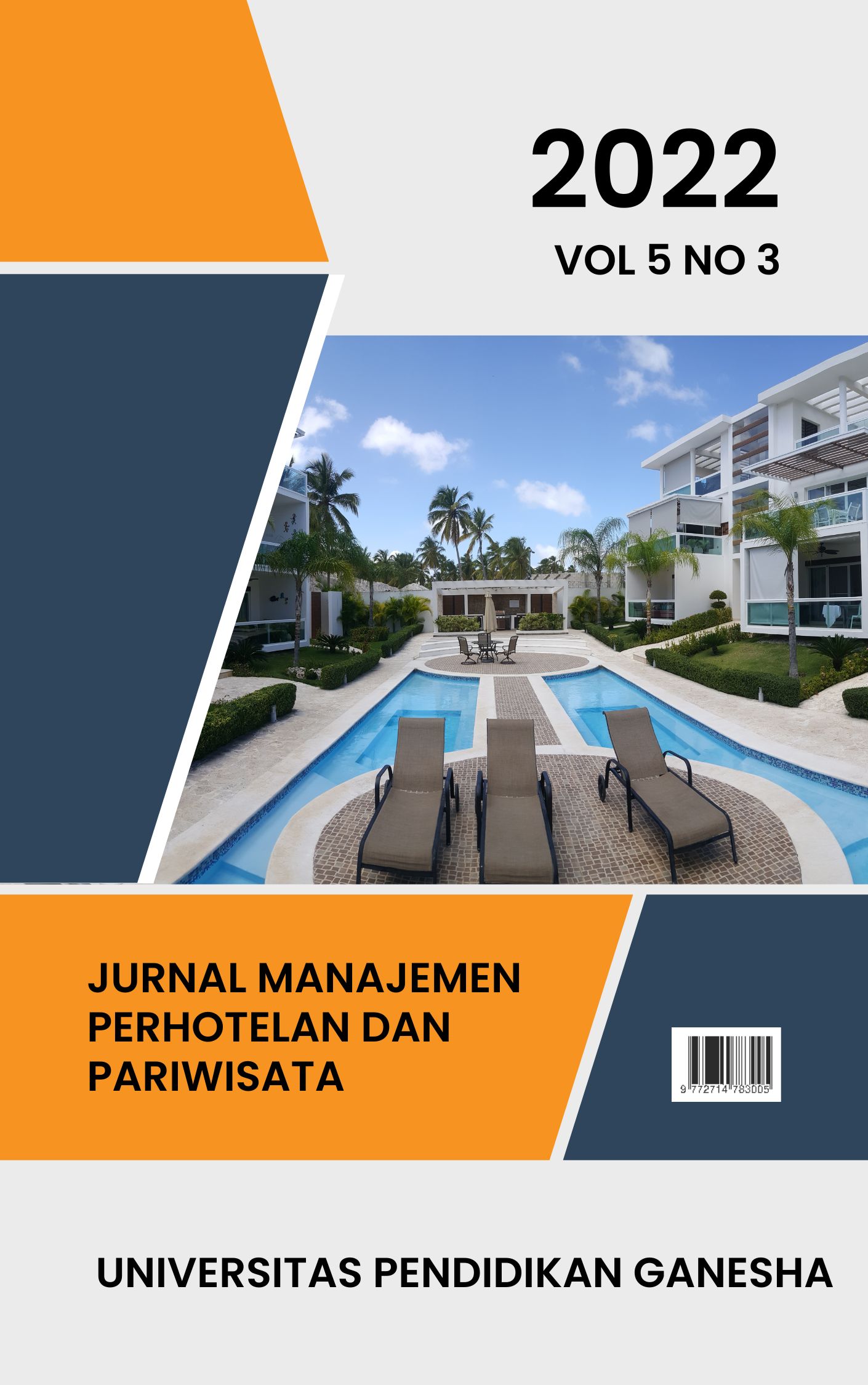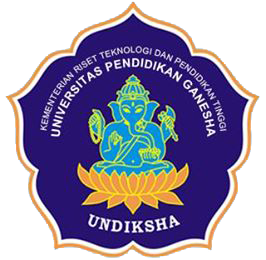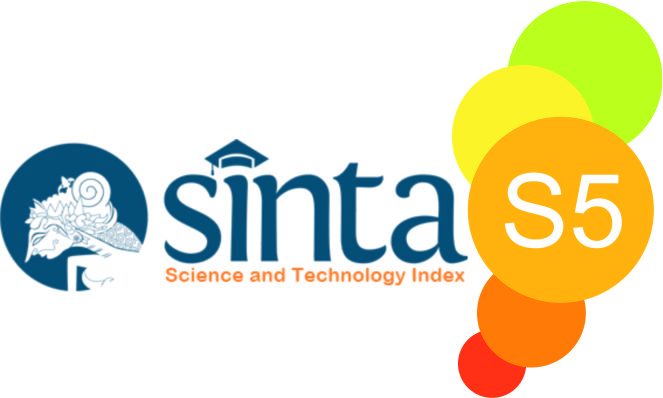Impak Intervensi Non-Farmasi terhadap Penerapan Prinsip Green Hotel di Sarinbuana Eco Lodge
DOI:
https://doi.org/10.23887/jmpp.v5i3.53350Keywords:
Green Hotel, Non Pharmaceutical Intervention, EcolodgeAbstract
The development of sustainable tourism are efforts made by the government in dealing with the Covid-19 pandemic, in addition to the implementation of various non-pharmaceutical intervention policies. The green hotels concept emerged as an alternative that could be applied by accommodation providers in an effort to develop sustainable tourism. This study aims to analyze the dimensions of the Green Hotel concept and impact of non-pharmaceutical interventions on the application of green hotel concept at Sarinbuana Eco Lodge. A qualitative approach was done by conducting interviews with employees and management as well as observations. The data were analyzed using qualitative analysis using three stages, namely data reduction, data presentation, and conclusions. Green hotel concept has been implemented by several aspects such as environmentally management and hotel operations, environmentally land management, energy efficiency, water conservation, efficient use of building materials, local and products, air quality for health and control of convenience and waste management. The impact of non-pharmaceutical interventions in this ecolodge consists of several things, namely cancellation of guest arrivals, adjustment of employee work schedules, arrangement of guest activities during their stay at the ecolodge, temporary management carried out by the ecolodge owner's family. Management will improving the green hotel concept in hotel operational.
References
Abdullah, T., & Pebriyanti, K. (2016). Pengaruh program green hotel terhadap keputusan menginap tamu di the Royale Krakatau Hotel Cilegon Banten. THE Journal : Tourism and Hospitality Essentials Journal, 6(1), 1023. https://doi.org/10.17509/thej.v6i1.2013
Aminuddin, I., Krishnadianty, D., Syukur, A. G., & Dian, I. A. (2016). Panduan Pengembangan Akomodasi Wisata Ramah Lingkungan. Skripsi: Politeknik Negeri Bandung.
Aquarini. (2020). Pengaruh kebijakan politik terhadap kepatuhan physical distancing mencegah penyebaran covid-19 effect of political policy on physical distancing compliance preventing the spread of covid-19. Anterior Jurnal, 19(2), 86–93.
Asean Tourism. (2018). Asean tourism standards 2018-2020. Asean Tourism Forum 2018.
Chung, J. Y., Lee, C. K., & Park, Y. . (2021). Trust in social non-pharmaceutical interventions and travel intention during a pandemic. Journal of Vacation Marketing, 27(4), 437–448. https://doi.org/https://doi.org/10.1177/13567667211009584
Hardani, Sukmana, D. J., & Andriani, Helmina, Fardani, R. (2020). Buku metode penelitian kualitatif dan kualitatif. Yogyakarta: CV. Pustaka Ilmu.
Hutapea, A. P., & Hutapea, L. (2021). Tingkat kepatuhan mahasiswa/i yang sudah divaksin dalam melaksanakan protokol kesehatan di masa pandemi covid-19. Jurnal Penelitian Perawat Profesional, 3(4), 749–758. http://jurnal.globalhealthsciencegroup.com/index.php/JPPP
Kamil, I. (2021). 1.677.274 kasus covid-19 di Indonesia dan imbauan Presiden agar masyarakat tak optimisme berlebihan. Nasional.Kompas.Com. https://nasional.kompas.com/read/2021/05/03/06573921/1677274-kasus-covid-19-di-indonesia-dan-imbauan-presiden-agar-masyarakat-tak?page=all
Kement, U., Çavuşoğlu, S., Demirağ, B., Durmaz, Y., & Bükey, A. (2022). Effect of perception of covid-19 and nonpharmaceutical intervention on desire and behavioral intention in touristic travels in Turkey. Journal of Hospitality and Tourism Insights, 5(1), 230–249. https://doi.org/10.1108/JHTI-07-2020-0139
Peraturan Menteri Kebudayaan dan Pariwisata, Pub. L. No. PM. 86/HK.501/MKP/2010, 1 (2010). www.jdih.kemenparekraf.go.id
Kementerian Pariwisata Republik Indonesia. (2016). Panduan dan pedoman pelaksanaan green hotel di Indonesia. 1–156.
Kumaji, R. A., Hakim, L., & Pangestuti, E. (2021). Ecolodge sebagai sarana akomodasi pariwisata berkelanjutan. Profit, 15(01), 27–42. https://doi.org/10.21776/ub.profit.2021.015.01.4
Kusuma, B., Bagus Kusuma Wijaya, & Wayan Eny Mariani. (2021). Dampak pandemi covid-19 pada sektor perhotelan Di Bali. Warmadewa Management and Business Journal (WMBJ), 3(1), 49–59. https://doi.org/10.22225/wmbj.3.1.2021.49-59
Nuruddin, Wirawan, P. E., Pujiastuti, S., & Sri Astuti, N. N. (2020). Strategi bertahan hotel di bali saat pandemi covid-19. Jurnal Kajian Bali (Journal of Bali Studies), 10(2), 579. https://doi.org/10.24843/jkb.2020.v10.i02.p11
Purwahita, A. A. A. R. M., Wardhana, P. B. W., Ardiasa, I. K., & Winia, I. M. (2021). The impact of covid-19 on Bali tourism in terms of the social, economic, and environmental sector (A literature review). Journal of Tourism Studies and Applied, 1(2), 68–80.
Sanjiwani, I. G. A. M. (2022). Strategi bertahan pada masa pandemi covid-19 di Ancak Restaurant. Jurnal ALTASIA, 4(1), 18–27.
Simarmata, R. A., Naibaho, R. W., Simarmata, J., & Setiawan, E. B. (2021). The perception effect of covid-19 and non-pharmaceutical interventions (NPI) on behavioral intention in touristic travel at Indonesia. Advances in Transportation and Logistics Research, 4(0), 574–585. https://proceedings.itltrisakti.ac.id/index.php/ATLR/article/view/418
Sinangjoyo, N. J. (2013). Green hotel sebagai daya saing suatu destinasi (Studi kasus pada industri hotel berbintang di wilayah Yogyakarta). Jurnal Nasional Pariwisata, 5(2), 83–93. https://journal.ugm.ac.id/tourism_pariwisata/article/view/6368
Sugiyono. (2016). Metode penelitian kuantitatif, kualitatif dan R&D.
Suryaningsih, I. . A., & Oka Suryawardani, I. G. A. (2021). Strategi bertahan hotel berbintang dalam menghadapi situasi covid-19 di Kabupaten Badung, Bali. Jurnal Kajian Bali (Journal of Bali Studies), 11(2), 387. https://doi.org/10.24843/jkb.2021.v11.i02.p08
Widyaningsih, H., Krestanto, H., & Atmoko, T. P. H. (2021). Diversivikasi produk dan efisiensi bisnis dalam keberlanjutan green hotel pada era new normal di Hyatt Regency Yogyakarta. Jurnal Pariwisata, 8(2), 148–157. https://doi.org/10.31294/par.v8i2.11505
Yuniati, N. (2021). Green hotel concept and practices in Indonesia. E-Journal of Tourism, 8(2), 184. https://doi.org/10.24922/eot.v8i2.76346










